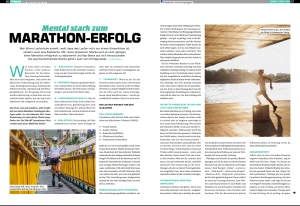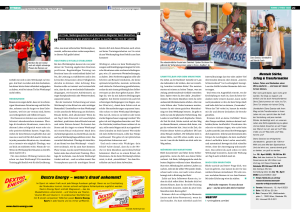If you want to achieve your goals, you should consider several building blocks for marathon training. One must not forget that, in addition to the physical preparation, goal setting, goal programming, self-confidence, optimization of the movement sequence, arousal control and activation before the start also play an essential role in order to successfully achieve your defined goal on day X.
The first thing every runner should think about before training for a marathon is a specific goal. Because goal setting is not the same as goal setting. Therefore formulate the goal SMART! What are SMART goals?
S - SPECIFIC: Concretely formulated goals help you with mental preparation, such as visualization and training discipline.
M - MEASURABLE: Name qualitative criteria that you can use to determine whether you have achieved your goals. Motivation increases when you see progress.
A – EXECUTABLE/ATTRACTIVE: what is your motivation Your goals should be challenging, but at the same time achievable! Think about what values are driving you, why do you want to achieve your goal? what guides you
R – REALISTIC: It is important to set ambitious goals. More importantly, they are realistic and actionable! This is where a good training plan that is tailored to you can help!
T – TERMINATED: If you set yourself a realistic time frame for reaching your goals, nothing stands in the way of you staying focused! You could potentially be running a marathon after just one month of training - and damage your health. That `s not worth it.
The last few weeks before the marathon
TARGET VISUALIZATION
Visualize your goal with the help of a meditation with all your 5 senses (VAKOG):
V – Visual (see)
A – Auditory (listening)
K – Kinesthetic (feel)
O – Olfactory (smell)
G – Gustatory (taste)
Imagine how it will feel when you pass the goal. What noises, voices, music do you hear? What do you see? Maybe you taste the salty sweat on your tongue? How do the emotions feel? You can change the intensity of the sounds, smells and other perceptions and even hide them. Turn your head cinema slowly or particularly fast! Look at yourself from the outside and see how proud and happy you are! Imagining a successful future is a very important pillar to achieve your goal.
TRAIN MOVEMENT PROCESSES
Those who visualize their movement sequences will experience less stress during competitions. The effect achieved with the conscious, intensive visualization of movement sequences depends on how lively the visualization is – how well one succeeds in putting oneself in the movement and empathizing with the inner processes. You can ask yourself what you would look like if everything went smoothly. How would other people perceive you? What would you do exactly and how would it feel exactly?
Alternating between mental training and actual training is important for an effective result. In this way you can always compare the action in your imagination with the actual action carried out and keep improving. So think about how your training will go before that! Before you start your workout, take a few minutes to relax with a breathing exercise that is comfortable for you and imagine what your workout will feel like.
FIND THE MIDDLE OR. BEING AND STAYING HERE AND NOW
In a marathon it is important not to be distracted by the outside world. Concentrating on keeping the pace, not going too fast or too slow, is called focus. If you remain focused on your goal, you will also reach the goal successfully. A lot of unexpected things can happen during the 42.195 km. If you feel like you are not with yourself, observe what is happening around you - without thinking or judging it. Remember that you can control many things like your pace, step frequency, food and drink - as well as your thinking. Take advantage of this tool, control your thinking, stay yourself, remember how well prepared you are and stay focused! Remembering the breathing exercises you did before your workouts can rebalance your thoughts and focus.
AFFIRMATIONS / MANTRAS ÜBERLEGEN
Thoughts will come and go if you are not focused and focused on the "task". Therefore, it is important to learn to control the positive thoughts in oneself. The control through self-talk regulation, self-commands or self-instructions have a great influence on our competition and also on training. Think about and write down positive affirmations that you can then say out loud or in your mind in a critical situation. For example: "Focus", "Breathe easily", "Pull it on!", "Look ahead", "Believe in yourself", "Cheer up" and others that you believe are believable. You should already use this in training. Instead of words and sentences, it can also be pictures and symbols that put you in a positive mood. You can write or draw them on your arm. Practice concentration through self-instruction in training before you use it in competition!
THOUGH STOP
If negative thoughts don't let go of you in a critical situation, say "stop" to yourself, loudly or quietly. You can think of the road sign or a red traffic light. You may find a suitable gesture that symbolizes "stop" for you. Think of a positively worded set of instructions that will boost your self-confidence and say them out loud! Stopping negative thoughts as soon as possible is very important to successfully completing your competition. This also applies to training: it is important to bring a good feeling into the competition. Standing at the start thinking you gave up on your last interval session won't help when you're at a low in the competition.
RESOURCES
Resources ensure that we find orientation and support in difficult situations, take away our fear of the unknown because we are familiar with them, and offer us security and self-confidence.
The resources can come from different areas of life. Think about concrete situations when you were successful in your life or had a very positive experience. Ask yourself what this resource has helped you with and what makes it so valuable to you. Use them in every suitable situation, visualize them as intensively as possible! Think about what affects you the most. Make up your mind: If the situation x occurs in the competition, then I will do y.
For a stronger effect, practice this before the competition! The same applies to mental training as to nutrition: Everything you use during the competition should be tried out beforehand, in this case practiced!
ESTABLISH ROUTINES & RITUALS
At the competitions, you can benefit from each of your learned routines during training. Regular training of routines can help you to stabilize your performance and to be able to call on your skills in critical situations. But beware: A routine should be practiced and internalized in such a way that you can adapt it to changing conditions, such as shorter warm-up times, a starting area that is too narrow or a change in the weather.
Ritual is a very important part of mental preparation for a competition. The mental stress is greatest immediately before the competition. Rituals help distract you! If you want to reach your full potential on day X, practice your rituals consciously and take advantage of them! You can reduce the stress and anxiety before a competition with a ritual! Make your warm-up routine a ritual that you will also perform on race day. That conveys security. Think about your ritual the evening before the competition - visualize again how you get to the start. Plan ahead what you will eat for breakfast, it is best to test this during training. Think again about what you drink and eat at the competition - and especially when! Planning ahead saves you unnecessary stress! Prepare yourself for your training sessions with these rituals! So you will get to the start on the day of the competition without hectic!
It is important to come up with solutions and coping strategies for critical situations or difficult conditions, e.g. B. unexpected weather conditions. Your preparation plan should include all the steps and rituals that ensure your optimal physical, mental, technical and tactical preparation so that you can start with the greatest possible self-confidence. Think about how you deal with external conditions. It is best to train even in difficult conditions (such as rain, strong winds, etc.) so that your brain can adapt to such challenges. So think before the competition: What do I do when it's too hot or when heavy rain showers are forecast? How do I deal with stomach problems? What drinks/food should I consume if my stomach fails me for any reason? How do I boost my confidence should the pace slow down? How do I deal with sudden physical pain?
And something else very important: your sleep! Make sure you get enough sleep in the week leading up to the marathon. Make it a ritual to “feel” the emotions you will experience at the competition. Before falling asleep and after waking up.
SHORTLY BEFORE THE MARATHON
You are at the starting line! Enjoy it! Let the adrenaline work in you, but be careful, keep calm anyway! Most start with too high a tempo, which creates breathtaking feelings at the beginning. But later you will have to “pay” for it. Running a marathon won't keep you feeling happy all the time. But you can control how many highs or lows there will be with targeted mental training before the competition. It's not just about the physical preparation. Running is and remains a matter of the mind. Take time for yourself, look back on the path to this moment, remind yourself how well prepared you are. Now is the time to pick the fruits of your labor! YOU have established your rituals, YOU are in your midst because YOU already know what to do. Don't let the hustle and bustle around you get in your way.
DURING MARATHON
Stay focused and talk to yourself when you lose your center. I find self-talk is the best companion during a marathon. Instead of looking for a distraction from other runners, talk to yourself! Those who think positively look ahead, those who look ahead move towards the goal!
Build your self-worth by praising yourself. Thank your body for a great workout by doing your best in the marathon now!
Remember successful moments (use your resources too) if you need to. You have certainly been able to overcome one or the other low during interval training or defeated your “inner weaker dog” when you were listless. Let the feeling of strong moments carry you on.
And when there comes a moment when the exhaustion is so severe that you can't control your thoughts, find someone in front of you walking your pace and hold on to your pacemaker. When the low is over, you can enjoy the route with yourself and your thoughts again.
Remember your role models! When your pace slows down, think of your running hero! Visualize him/her in front of your eyes as he/she looks while running, let his/her movements inspire you. Your body unconsciously takes on the lightness that your running hero radiates while running, and you automatically move on faster without noticing the effort. You should also practice this before the competition so that the effect is really strong on day X.
Look back and celebrate! Ask yourself, what have you learned, what can you take with you for the next race! We all know: after the race is before the race. With every experience you become stronger.
And don't forget: Do what you do wholeheartedly - and you will achieve your goal!
I wrote this article for the Running&Fitness magazine issue 113 March 2023 https://running.co.at

Erfolg im Marathon Diana Dzaviza

Marathonerfolg Diana Dzaviza

 Spartathlon Greece
Spartathlon Greece